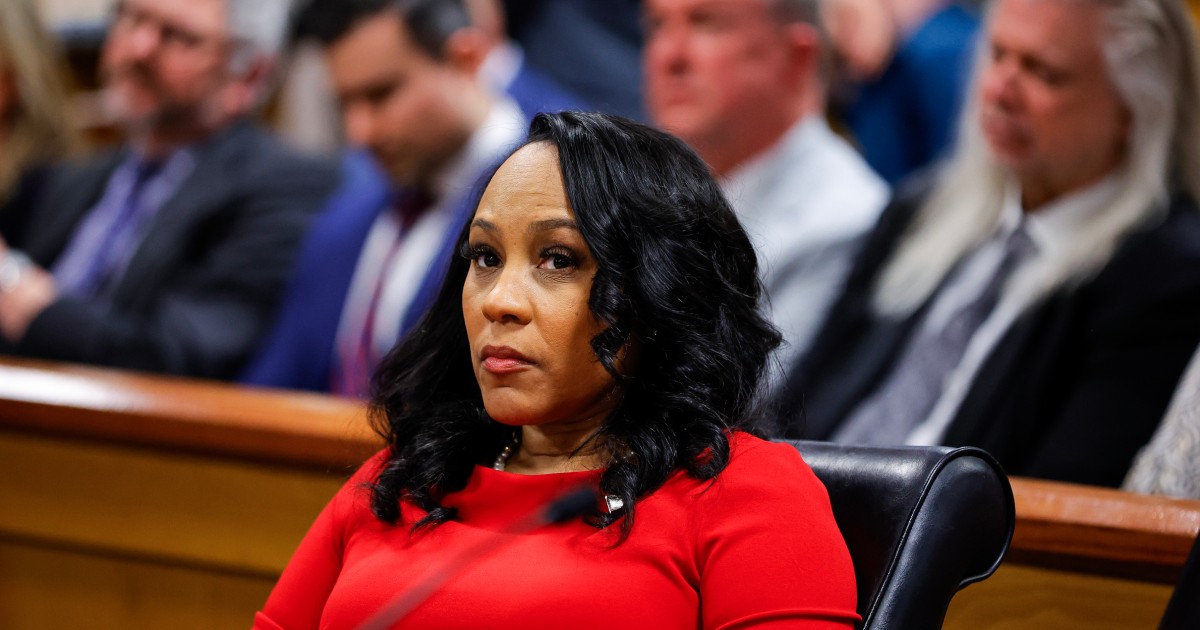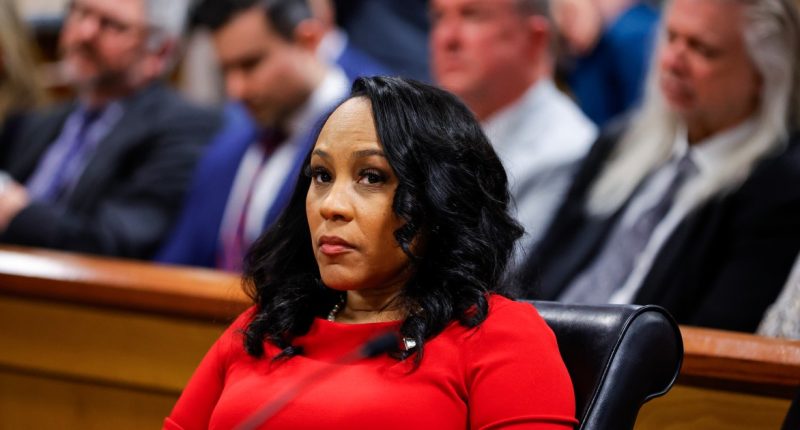
A Georgia judge’s ruling Friday declining to disqualify Fulton County District Attorney Fani Willis from her election interference case against former President Donald Trump and his co-defendants on conflict of interest grounds could allow the prosecution to get back on track and quickly, but there are potential roadblocks.
One potential obstruction was removed Friday afternoon when Willis accepted the resignation of Nathan Wade, the special prosecutor she appointed to lead the case. Fulton County Superior Court Judge Scott McAfee had said in his ruling Friday that either Willis and her office or Wade had to leave the case after finding her romantic relationship with Wade resulted in an “appearance of impropriety.”
Wade submitted his resignation later Friday and said he was resigning in part “to move this case forward as quickly as possible.”
Had Willis agreed to recuse herself from the case, the Prosecuting Attorneys’ Council would have to find another prosecutor with the resources to take on the sprawling and politically charged case — a process that would likely ensure that the case would not go to trial until next year at the earliest.
Can Trump appeal?
While Trump and his co-defendants in the case do not have the ability to appeal McAfee’s decision not to disqualify Willis at this stage of the case, they could ask McAfee to approve a “certificate of immediate review,” which would essentially have the same effect.
Trump attorney Steve Sadow suggested in a statement Friday that he could seek such a review.
“While respecting the Court’s decision, we believe that the Court did not afford appropriate significance to the prosecutorial misconduct of Willis and Wade,” Sadow said. “We will use all legal options available as we continue to fight to end this case, which should never have been brought in the first place.”
The judge has shown an openness to sign off on such reviews before, and recently.
In a separate ruling earlier this week where he dismissed six of the charges against Trump and some of his co-defendants, McAfee said he would “likely grant” such a request if the DA’s office decided it wanted to challenge his ruling.
But Amy Lee Copeland, a defense lawyer and former federal prosecutor in Georgia, said the judge’s failure to include similar language in Friday’s ruling could be a sign he does not view this decision the same way.
If the decision does undergo appellate review, it’s unclear whether the case would proceed while that review is pending. Norm Eisen, who worked for House Democrats during Trump’s first impeachment, said he did not believe a stay would be needed since the judge’s ruling “made clear” that none of the allegations “goes to the evidence in this case” or to the “issue of any defendants’ right to be tried or not.”
Copeland said if the state Court of Appeals agrees to hear an immediate review, there could be a stay of the proceedings, but added that she doesn’t believe the defendants will clear the necessary hurdles to get a review.
When will the trial take place?
McAfee has yet to set a trial date in the case. In November, the DA’s office had asked for an August 5, 2024 trial. Sadow told the judge at a hearing in December that date would be the “most effective election interference in the history of the United States,” given that Trump was likely to be the Republican presidential nominee by then. (Trump became the presumptive nominee earlier this week.)
Trump’s lawyers asked that the trial be scheduled for after the election and said that if he wins, it would need to take place after he serves his term in office.
Wade told the judge he didn’t think an August trial in “any way impedes defendant Trump’s ability to campaign or do whatever he needs to do in order to seek office,” while also acknowledging it’s expected to last at least four months — which would be past Election Day if it were to start in August.
The DA’s office had argued the August date made sense because of the three other Trump criminal trials that were scheduled to take place earlier in 2024. All of those trial dates, however, are now up in the air.
Trump has pleaded not guilty in all four cases, which he maintains are part of a partisan “witch hunt.”
Where do Trump’s other trials stand?
A trial in Trump’s federal election interference case, which had been scheduled for March 4, has been put on indefinite hold while the U.S. Supreme Court weighs Trump’s presidential immunity claims.
Another trial in Florida on federal charges Trump mishandled and hid classified documents is still officially scheduled for May 20th, but the Trump-appointed judge overseeing that case has indicated she will push that date back.
The third case, Manhattan District Attorney Alvin Bragg’s case alleging Trump falsified business records in order to cover up hush money payments to an adult film star, was scheduled to go to trial on March 25, but that date was put off until at least next month.
Judge Juan Merchan agreed to the delay after federal prosecutors in New York belatedly turned over more than 100,000 pages of evidence related to the state’s key witness in the case, Michael Cohen.
Eisen said the uncertainty around the other trial dates has created an opening for Willis to seek to go to trial before August. “They should request a fast trial,” Eisen said. “They’ve said before they could be ready in 30 days,” he added, and “now that we’re past the sideshow,” the “need is for speed.”
Source: | This article originally belongs to Nbcnews.com










